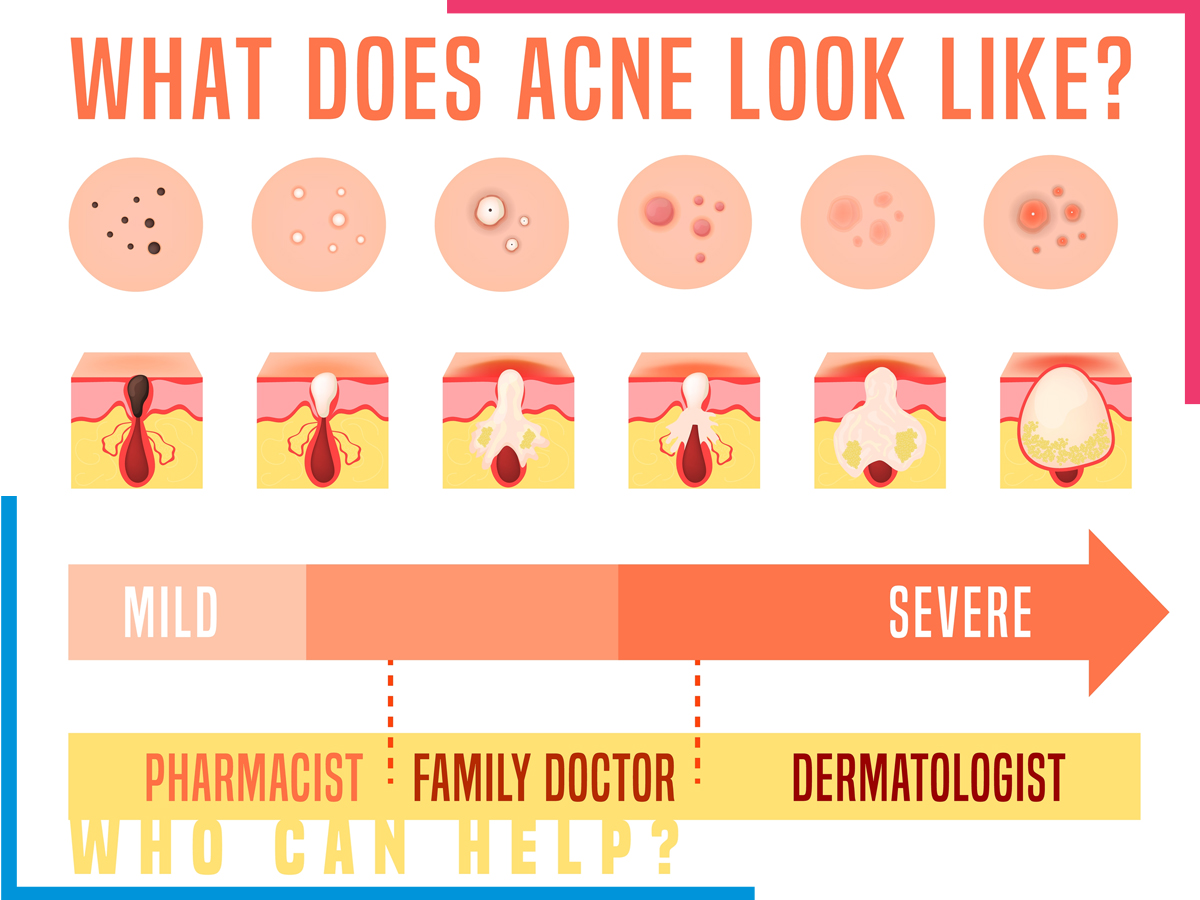What is Acne?
Acne is a skin condition that develops when hair follicles become clogged with oil and dead cells, leading to pimples, blackheads, whiteheads and cysts. This condition may be triggered by hormones, genetics and lifestyle choices; hormonal changes like those experienced during puberty may contribute to its development. Certain medications like steroids or birth control pills may also increase one's likelihood of developing acne.
Types of Acne
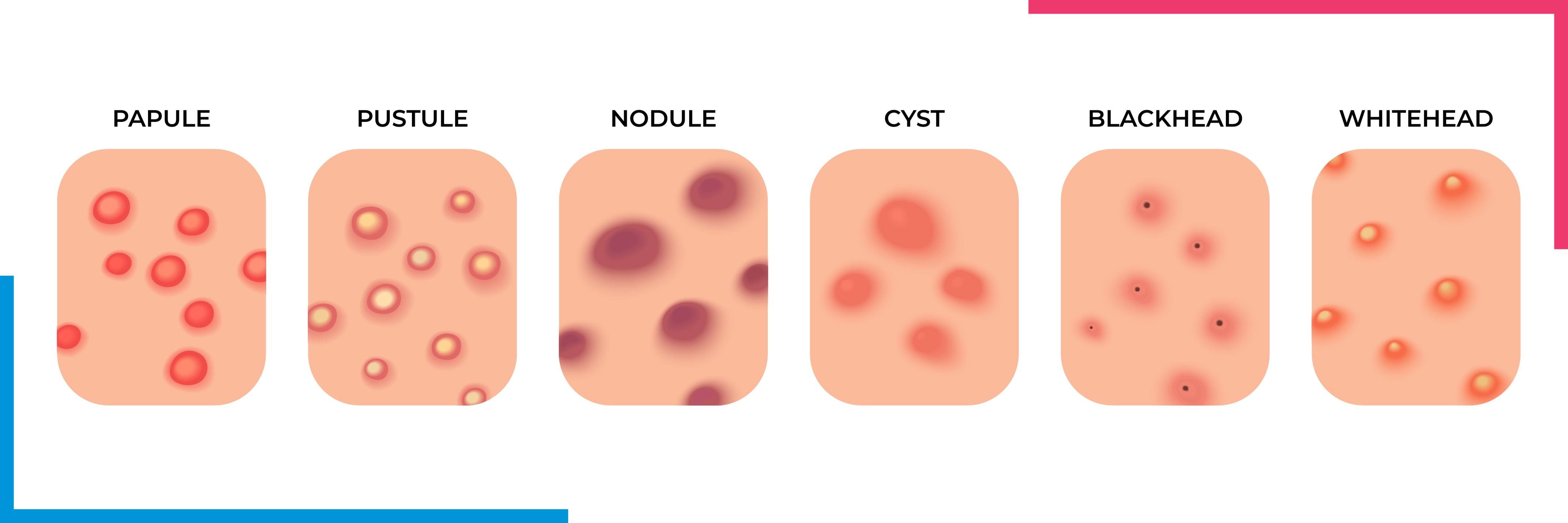
Comedones are non-inflammatory lesions that can manifest as either blackheads or whiteheads. Blackheads occur when clogged pores have opened and become exposed to air, giving off a dark complexion; on the other hand, whiteheads are closed pores that appear as small bumps on the skin's surface.
Papules: Papules are skin lesions that appear as red bumps on the skin. They can be painful and occur in clusters due to bacteria or excess oil clogging hair follicles.
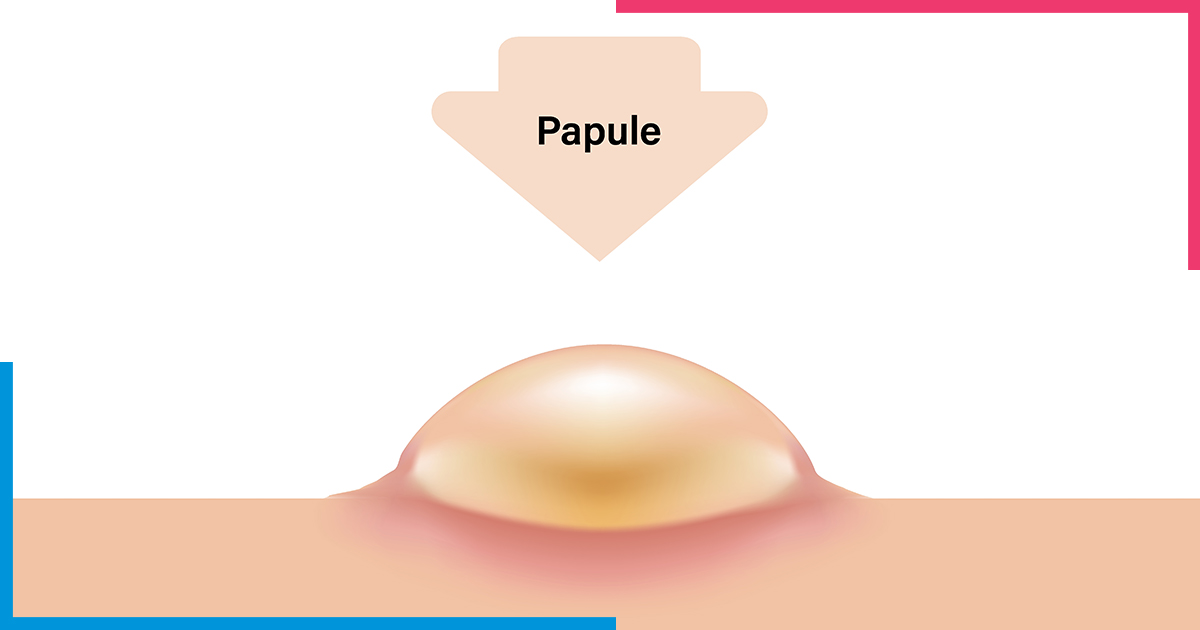
Pustules: Pustules are inflamed lesions similar to papules but filled with pus. They appear as white or yellow bumps on the skin and may cause pain when touched.
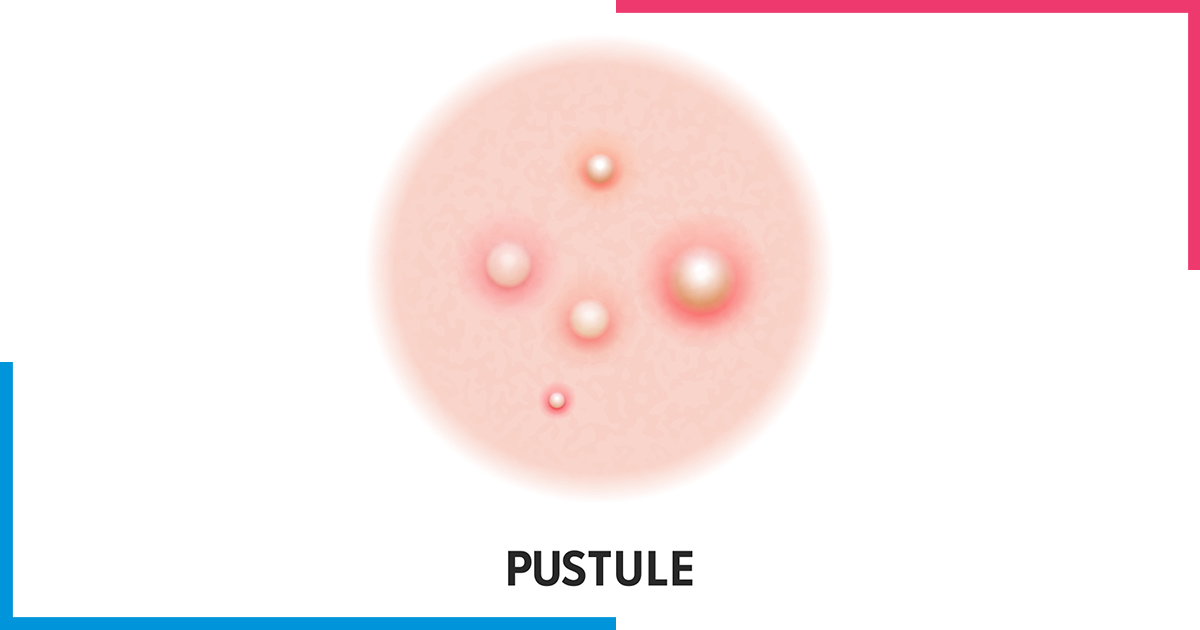
Nodules: Nodules are large, painful and deeply-seated lesions beneath the skin's surface. These severe forms of acne often leave scarring and require medical intervention for treatment
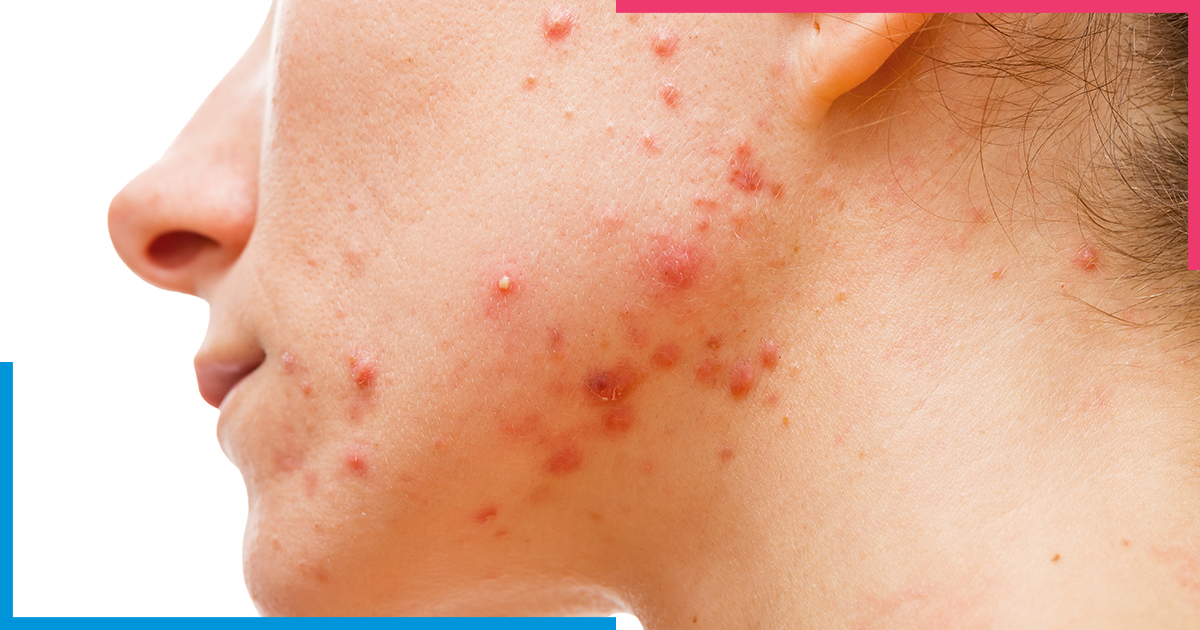
Cysts: Cysts are a severe form of acne that develops when pores become clogged, and the infection spreads deep into your skin. They contain pus, which can be painful or lead to scarring if left untreated.
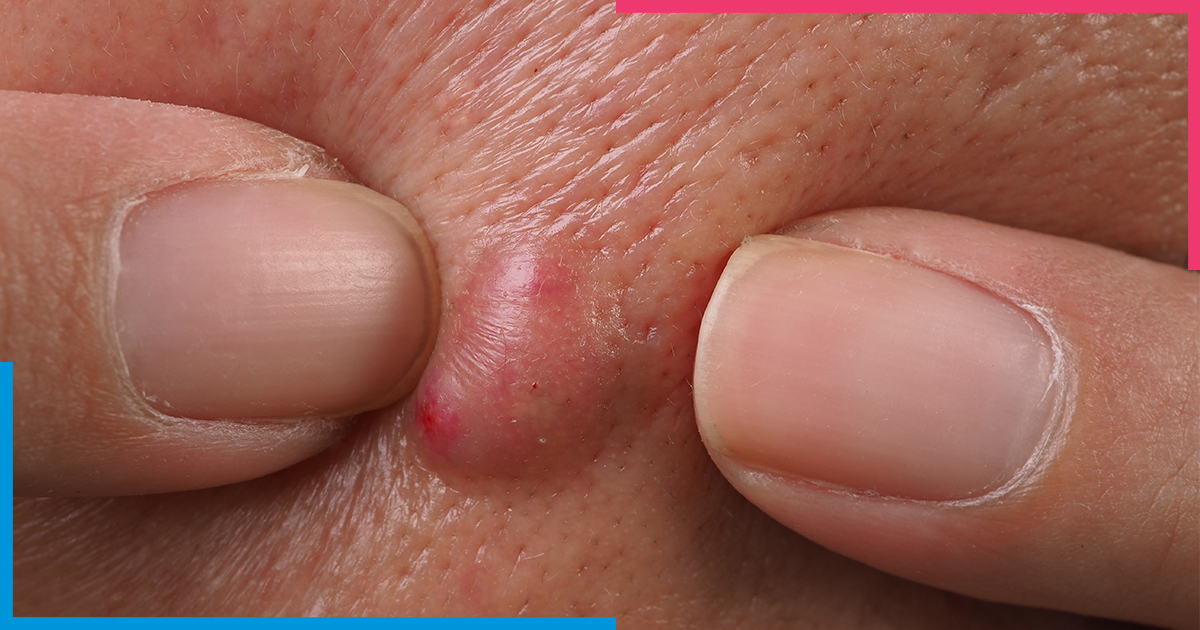
Acne should always be diagnosed, and the appropriate course of treatment determined. Milder cases, such as comedones, can usually be managed with over-the-counter medications; however, moderate to severe cases like papules, pustules, nodules, or cysts may require medical intervention such as prescription medications, chemical peels or laser therapy for resolution.
Causes of Acne: Understanding the Factors that Contribute to Acne Development
Acne is a skin condition that develops when hair follicles become clogged with oil and dead skin cells. Though the exact cause of acne remains unknown, several factors have been linked to its development:
Excess oil production:When the body produces too much oil, it can combine with dead skin cells and clog hair follicles, leading to acne formation.
Hormonal changes: Hormonal fluctuations such as puberty, pregnancy or menstruating cycles can cause the body to produce more oil which in turn contributes to acne formation.
Bacteria:Certain bacteria, such as Propionibacterium acnes, can contribute to acne by inflaming hair follicles.
Genetics:Acne can run in families, suggesting there may be a genetic component to its development.
Certain medications: Certain medications, such as corticosteroids or lithium, can contribute to the development of acne.
Diet: Though there is limited scientific evidence linking diet to acne development, some studies suggest that consuming a diet high in sugar and processed foods may contribute to its appearance.
Stress: Stress can play a significant role in the development of acne by increasing oil production throughout the body and inflaming hair follicles.
It's essential to remember that acne isn't caused by poor hygiene or dirty skin. In fact, over-washing or scrubbing the face may actually aggravate acne by damaging hair follicles and creating inflammation.
Effective Treatments for Acne and its Potential Side Effects.
- Topical Treatments
- Benzoyl peroxide: This medication effectively treats acne by eliminating the bacteria responsible for it and decreasing inflammation.
- Retinoids: Retinoids work by unclogging pores, decreasing inflammation and stimulating new cell growth in your skin.
- Salicylic acid: This medication works by unclogging pores and relieving inflammation.
- Antibiotics: These drugs work by eliminating the bacteria responsible for acne and decreasing inflammation.
- Azelaic acid: This medication works by inhibiting the production of keratin, a protein that can clog pores, as well as relieving inflammation.
- Antibiotics
- Chemical Peels
- Laser Therapy
- Microdermabrasion:
- Isotretinoin:
Topicals such as benzoyl peroxide, salicylic acid and retinoid can help unclog pores and reduce inflammation.
Topical treatments are medications applied directly onto the skin to treat various skin conditions, such as acne, eczema, psoriasis and fungal infections. Topicals come in many forms, like creams, gels, ointments, lotions or solutions, which come either in cream or gel form.
Topical treatments for acne work by decreasing oil production, unclogging pores and relieving inflammation. Common topical solutions include:
Topical or oral antibiotics can help combat acne bacteria and reduce inflammation by eliminating it from your system.
Antibiotics are often prescribed to treat acne, either in the form of topical creams and gels or oral medications. These antibiotics work by eliminating bacteria that cause acne and decreasing inflammation within hair follicles.
Topical antibiotics, applied directly onto the skin, are frequently employed for treating mild to moderate acne. Common topical antibiotics used for this purpose include clindamycin and erythromycin. These antibiotics work by eliminating bacteria responsible for acne while decreasing inflammation within hair follicles.
Oral antibiotics, taken by mouth, are often prescribed to treat moderate to severe acne. Common oral antibiotics used for this purpose include tetracycline, doxycycline and minocycline; these antibiotics work by decreasing bacteria on the skin while relieving inflammation within hair follicles.
Antibiotics can be highly effective for treating acne, but they come with risks as well. Excess antibiotic use could create antibiotic-resistant bacteria, making future infections much harder to treat. Furthermore, antibiotics may cause unpleasant side effects like upset stomach, diarrhoea and increased sensitivity to sunlight.
If you are considering antibiotic treatment for acne, it is essential to consult with a skin acne specialist in Bandra who can assess your condition and recommend the most appropriate treatment plan for you.
Chemical peels treatment involve applying a chemical solution to the skin, which causes its outermost layer to peel away, revealing smoother and clearer skin beneath.
Chemical peels come in a range of strengths, from mild to deep. Milder chemical peels typically utilize alpha hydroxy acids (AHAs) like glycolic acid for exfoliation and improved texture and tone. Medium-depth peels use trichloroacetic acid (TCA) for deeper penetration into cells while treating more serious skincare issues. Finally, deep chemical peels with phenol are the most intense option and should only be performed by an experienced professional.
If you're in Bandra West and searching for a face acne treatment, chemical peels could be an option to consider. Chemical peels have the potential to dramatically improve your skin's appearance by exfoliating its top layers and decreasing acne scarring; however, it's essential to remember they also carry risks.
Chemical peels commonly cause redness, swelling and peeling of the skin. In rare cases, more serious reactions like scarring or changes to skin tone may take place; thus it's essential that you consult a trained professional before undergoing this treatment.
A professional can advise you on which type and strength of peel would be most beneficial for you, as well as assess any potential risks or side effects to make sure chemical peels are the appropriate treatment for facial acne.
Laser therapy is an incredibly successful treatment for acne, so if you're searching for a skin acne specialist in Bandra, laser therapy should definitely be taken into account. This type of skin therapy utilizes focused light to target bacteria responsible for acne, reduce inflammation and stimulate collagen production to heal affected tissue.
When treating acne, various lasers can be used. Pulsed-dye lasers, diode lasers and Nd: YAG lasers are just some of the options available; however, the most suitable laser for each individual depends on their skin type and acne severity.
Laser acne treatments utilize light energy to penetrate deeply into the affected area and destroy bacteria while relieving inflammation. Most procedures are painless with little to no downtime required, though some redness or swelling may persist for a short period.
It's worth noting that laser therapy can be an effective treatment for acne, but it may not be suitable for everyone. Individuals with certain skin types or severe cystic acne should consult with a trained professional such as Skiinaceclinic in Bandra West before determining if laser therapy is the right choice for them.
In addition to laser therapy, there are other treatments available for acne, such as topicals, oral medications and chemical peels. A qualified dermatologist can assist you in selecting the most appropriate course of action tailored specifically towards your individual needs.
Microdermabrasion treatment is a non-invasive skin treatment that utilizes a handheld device to exfoliate the outer layer of skin. This eliminates dead cells and encourages new, healthier cell growth.
Microdermabrasion can be highly effective for treating acne in several ways. First, it helps unclog pores by clearing away dead skin cells, oil and other debris that contributes to breakouts. Second, microdermabrasion stimulates collagen production, which diminishes acne scars and improves skin texture; finally, microdermabrasion reduces inflammation and redness associated with acne.
It is essential to remember that microdermabrasion should never be used as a substitute for other treatments such as topical medications or chemical peels. Consulting with an experienced professional to determine if microdermabrasion is suitable for your individual needs and skin type is highly recommended.
Isotretinoin is an effective medication used to treat severe cases of acne that don't respond to other treatments. It works by decreasing oil production in the skin, which contributes to acne development. Isotretinoin should be taken orally as a pill, and the course usually lasts several months.
Isotretinoin is an organic derivative of vitamin A that works by binding to receptors on sebaceous glands that produce oil on the skin. By inhibiting oil production, isotretinoin helps prevent new acne lesions from forming and reduces existing ones' severity.
Although isotretinoin can be an effective treatment for severe acne, there may be some potential side effects. These could include dryness or peeling of the skin as well as more serious reactions such as depression and liver damage. Therefore, isotretinoin should only be prescribed by a qualified medical professional, with regular monitoring and follow-up recommended.
Before beginning isotretinoin therapy, it is essential to consult a healthcare professional. They can assess the potential advantages and potential risks, and then create an individualized treatment plan tailored specifically for you.
Are you searching for an acne specialist in Bandra, Mumbai? Look no further than Skiinaceclinc. Our clinic provides effective solutions for all types of acne, from mild to severe cases. Our experienced dermatologists use cutting-edge techniques and technologies to give our customers clear, healthy-looking skin. Contact us today for the best face acne treatment in Bandra West!
Conclusion
Acne is a skin condition caused by oil-clogged hair follicles filled with dead cells and oil. Excess oil production, hormonal changes, bacteria, genetics, certain medications taken for medical reasons, diet modifications and stress all play a role in its development. Acne can present in various forms, such as comedones, papules, pustules, nodules and cysts; depending on its severity, a treatment plan should be created. Over-the-counter topicals like benzoyl peroxide, salicylic acid or retinoids may help unclog pores and reduce inflammation. Moderate to severe cases may require medical intervention, such as prescription medications, chemical peels or laser therapy. Consulting a dermatologist or skincare specialist is your best bet for getting better and faster results from this type of treatment. Acne isn't caused by poor hygiene or dirty skin - seeking professional help is your best chance at permanently getting rid of acne!

